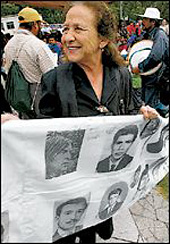 |
 |
 |
 News Around the Republic of Mexico | May 2006 News Around the Republic of Mexico | May 2006  
2 Accused in Mexico 'Dirty War' are Freed
 Lisa J. Adams - Associated Press Lisa J. Adams - Associated Press


| | A protester holds a banner of the 'disappeared' from Mexico's 'dirty war.' (Andrew Winning/Reuters) |
Two former top Mexican police officials accused of kidnapping a leftist rebel during Mexico's 'dirty war' were released early Sunday from prison.

Carlos Solana Macias, ex-director of the Judicial Police for the northern state of Nuevo Leon, and ex-Judicial Police agent Juventino Romero Cisneros, also known as "The Shark," left the Topo Chico prison in the city of Monterrey before dawn, Mexican newspapers and radio stations reported.

Solana was released after being detained five months and Romero was freed after a year and a half, the reports said. Both were accused of the 1975 kidnapping of leftist rebel Jesus Piedra Ibarra, whose disappearance became a symbol of the alleged crimes of government officials during the country's 'dirty war' in the 1960s and 1970s. It was not clear if either had been convicted.

The lawyer representing both Solana and Cisneros, Jorge A. Ruiz Velazco, told reporters his clients were released because of a legal reform. He did not elaborate.

Throughout the 1960s and '70s, small bands of Marxist guerrillas attacked the Mexican army and police, robbed banks and staged kidnappings. The government responded with a campaign to weed out suspected rebels and activists accused of supporting them. The National Human Rights Commission has documented the disappearance of at least 275 suspected rebels, including Piedra Ibarra. His mother, Rosario Ibarra, has fought a 30-year battle for justice in her son's case.

Mexico's Supreme Court cleared the way for arrests related to the dirty war in a 2003 ruling that said the statute of limitations does not apply to cases in which the victims were never seen again.

President Vicente Fox created a special prosecutor's office to investigate past crimes, but the office has had little luck prosecuting top officials, including former President Luis Echeverria.

Special Prosecutor Ignacio Carrillo brought criminal charges against Echeverria for his alleged involvement in the killings of dozens of students in separate Mexico City protests: in 1968, when he was Mexico's interior secretary, and in 1971, when he was president. But the courts blocked Echeverria's prosecution in both cases.

Cisneros was detained by federal agents on Nov. 8, 2004, after acknowledging during questioning by the special prosecutor's office that he had detained Piedra Ibarra, the news reports said. Solana, then Cisnero's boss, was captured on Dec. 29, 2005. | 
 | |
 |



